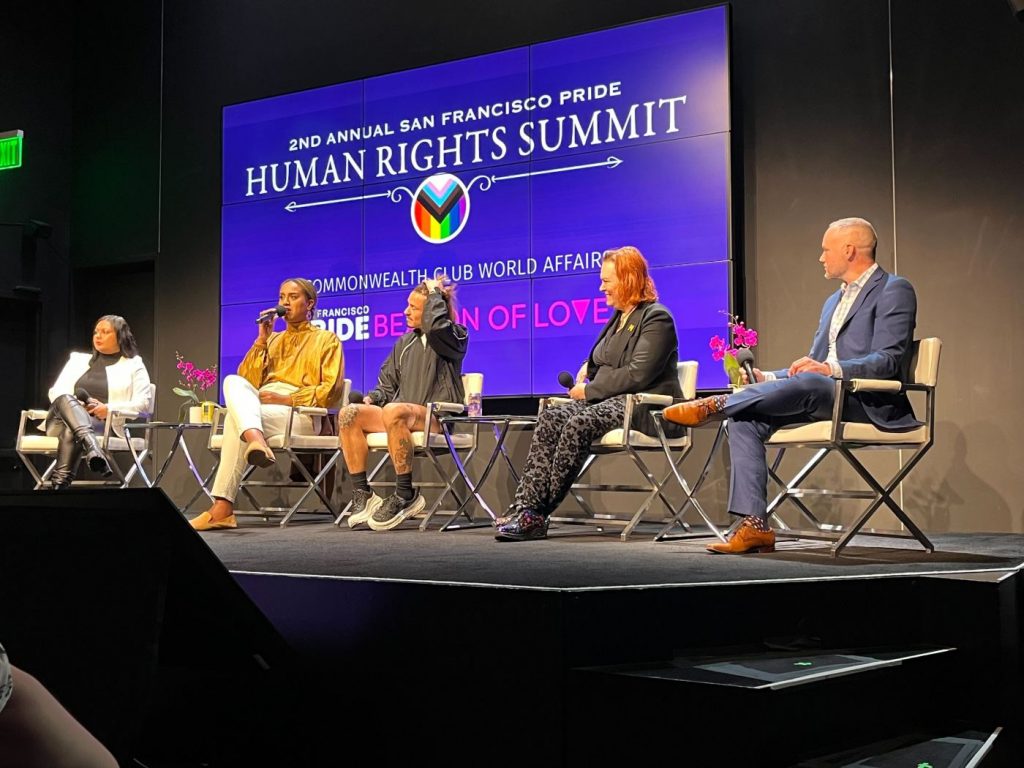SAN FRANCISCO – Finding a way for transgender athletes to remain welcome and involved in sports amid a national backlash was at the forefront of a summit this week in San Francisco as the city continued to shine a spotlight on Pride month.
Thursday’s SF Pride Human Rights Summit included panel discussions and speeches by community leaders — San Francisco mayor London Breed among them — and unfolded on a day in which nonbinary middle-distance runner Nikki Hiltz competed for a spot on the United States Olympic team.
“Us trans people, we’re all just people trying to survive and make it through this world together,” political activist Honey Mahogany said, later adding, “There are ways in which I think the trans community is providing an opportunity for us to collectively advance and grow as a society.”
A panel that included Mahogany, runner Cal Calamia, former pro golfer Cheryl Lala-Chávez and San Francisco Chronicle sports editor Christina Kahrl addressed the talking point most frequently cited when transgender athletes compete: athletes identified as male at birth transitioning to female, and then, critics presume, excelling in their sport.
“At any level where trans people have been allowed to compete, they haven’t dominated their sport in California,” said Kahrl, a transgender woman. “This has never happened. It’s a scare tactic against inclusion, about the perception that trans athletes have an advantage.”
The International Olympic Committee funded a study published this spring that analyzed trans athletes who transitioned from male to female, and it showed that by taking estrogen and being on hormone replacement therapy, athletes’ lung and heart capacity shrunk, Mahogany said.
Kahrl said that only one transgender athlete has won an Olympic medal in the past 20 years – a nonbinary Canadian women’s soccer player assigned female at birth – and described concerns over transgender athletes dominating as “an overstated bit of scaremongering.”
Calamia, who ran collegiately at St. Louis University and was the first nonbinary winner of the San Francisco Marathon in 2022, said that trans athletes face internal challenges, too.
“When we talk about trans athletes, we talk about that biological component of having some sort of biological advantage, and we know that’s not true,” Calamia said. “But I also want to talk about the mental, social and emotional toll and disadvantages that trans athletes have.
“I could never, if I wanted to, just be an athlete. I have to beg for my place on the starting line, and sometimes that begging lasts years before I can go there.”
Lala-Chavez grew up around golf, playing collegiately at Cal and later turning pro. But Lala-Chavez stopped playing after she came out as transgender in 2008.
“I completely left sport and I left golf, and I still have a very complicated relationship with golf,” Lala-Chavez said. “It is a rich, white sport and a very conservative sport. It was a sport that I never felt comfortable in as a person of color.”
On the other end of the spectrum, Calamia (who used he/they pronouns) said that he learned to love his sport again after coming out as nonbinary. He mentioned he will be watching Hiltz attempt to qualify for the U.S. women’s Olympic team, but also bemoaned the fact that there is no non-binary group at the highest levels of his or most other sports.
“Instead of trying to push the few trans folks that are at that level of the sport, we should be thinking about how we can get more trans and nonbinary folks into sports,” Calamia said.
As trans athletes such as Lala-Chavez and Calamia fight to be accepted in their sports, trans athletes across the U.S. are also battling to be allowed to compete.
Mississippi, Tennessee, Florida, Iowa and the Dakotas have all passed anti-transgender legislation that bars athletes from competing in events as anything other than the gender they were assigned at birth.
“This is barring entry to our youth, to our children, from accessing sport,” Lala-Chavez said. “Sports is supposed to be this place where we’re inclusive, learning life skills and all this other stuff. So all this legislation is going against is giving children access to sports at a very young age.”
Each of the panelists emphasized the importance of finding a way to relate to those who may not interact with transgender people in their day-to-day lives. Event organizer Michelle Meow agreed with this philosophy.
“The best thing for when we’re reaching across other communities that may not have all of the information and the education, is to share with them and lead with love,” Meow said. “At the end of the day, we’re all humans, and I think for a lot of states that have been passing anti-LGBTQIA+ laws, they’re given a lot of misinformation.”
Related Articles
Warriors’ Podziemski, Jackson-Davis named to USA Select Team
‘Pac-2’ mailbag: WSU, OSU options; MW merger cash; defining relevance
Chris Paul, Warriors agree to push back contract deadline: reports
Legendary San Jose State judo coach Yosh Uchida dies at age 104
California Clásico: Quakes to celebrate 50th anniversary during Saturday’s rivalry match against LA Galaxy
Mahogany emphasized that fighting that anti-inclusion information and those who spread it is at least half of the battle. Mahogany called for more federal regulation and what they called accountability for news organizations and social media platforms.
“Your messaging is only good if people can hear it,” Mahogany said. “It’s almost an impossible task unless we change the platforms and change the way that the information is shared and dispersed. Otherwise, we’re not going to be able to get that messaging out there.”
Meow said that while progress has been made, it can often seem like one step is taken backward every time a step is taken forward.
“There’s a lot of it that’s fear-based,” Meow said. “Imagine you’re sitting and talking with a family member. You probably wouldn’t want to impose the violence and danger and hate that’s being passed. Try to look at it from the perspective that we’re all human, and it could be your family member.”


